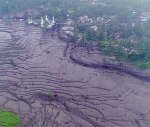You are here
Discussing nuclear security
Mar 22,2014 - Last updated at Mar 22,2014
Imagine the headline of this paper would read, “Terrorist group threatens to detonate a nuclear bomb in Amman if its demands are not met”. Most, if not all of the readers would be very terrified and a state of panic will overtake the scene.
To prevent headlines like this, heads of 54 states and governments from around the world will gather in The Hague, The Netherlands, for the Nuclear Security Summit on March 24 and 25.
The Hashemite Kingdom of Jordan will take part, represented by His Majesty King Abdullah. The heads of the EU, the IAEA, INTERPOL and UN Secretary General Ban Ki-moon will also participate in the summit. The event, considered one of the largest in The Netherlands ever, will witness around 5,000 delegates accompanying the world leaders, and about 3,000 journalists.
Hosting this summit illustrates The Netherlands’ commitment to peace, justice and security.
The venue of the summit, The Hague, is a logical choice as the city is also home to the International Criminal Court, the International Court of Justice, the International Criminal Tribunal for the former Yugoslavia, and the Organisation for the Prohibition of Chemical Weapons, and was the recent venue for the global conferences on freedom online and Afghanistan.
US President Barack Obama initiated the idea of the summit, and Washington hosted the first NSS in 2010.
The objective of the summit was, and is, to prevent sensitive nuclear material from falling into the hands of terrorists and criminals. The key points in reaching this objective are: reducing the global use of sensitive nuclear materials, improving the security of dangerous material worldwide, and reaching consensus and strengthening international cooperation.
Nuclear materials are used for a wide range of civilian and very legitimate purposes. We all know about nuclear energy that in many countries is the source of power to households and industry.
Nuclear materials also play an important role in healthcare, for example in the treatment of cancer. But the use of nuclear materials also has a hazardous side to it, reflected in the risk that these sensitive materials fall in the hands of the “wrong people” like terrorists or criminals.
Thankfully, there is a slight chance that this will happen.
Governments, companies, scientists and organisations from diverse parts of the world are therefore working together to prevent the misuse of nuclear material by reducing the quantity of sensitive nuclear material used, improving the security of existing nuclear material and working together in a more efficient and fruitful way.
The highest risk is posed by highly enriched uranium and plutonium. These materials can be used to make nuclear weapons, but are also used for civilian purposes.
Since this is such a high risk, many countries, including The Netherlands, have tried to reduce their use.
The less nuclear (research) reactors or other civil institutions work with highly enriched uranium or plutonium the lower the risk.
It is not just about reducing the use; existing stocks also have to be reduced. Stocks should be kept as low as possible and have to well secured.
Securing stocks and nuclear installations is the responsibility of governments.
There are international guidelines on the security of nuclear materials. There is also an international agreement with more binding obligations for states on security, but that is not yet working.
There are other nuclear materials that can, when in the hands of the wrong people, be used to make primitive nuclear bombs. Some of these materials are used in hospitals and industry. Seeing how these materials can be secured better is also one of the objectives of the nuclear security summit.
The summit is not about preventing accidents at nuclear power plants. The summit does not deal either with reducing or banning nuclear weapons. For disarmament, there are other meetings and conferences.
Unlike with nuclear security, the views on disarmament issues are much differentiated, making it very difficult to make progress there.
Jordan has always been an active player and contributor to the nuclear security summits, and not only during summits but also in the work and activities that resulted from the various summits. And that is where the real work is done.
In the volatile region in which Jordan is situated, security, especially concerning sensitive high-risk materials, is even more important.
The most visible result of the summit in The Netherlands should be a statement, agreed to by all participating states, which will set out what agreements they will make and what activities they will undertake in the coming years.
It is not the statement, but these agreements and actions that really can make a difference in making this world a little bit more secure.
I hope that the summit will facilitate and stimulate that. In that spirit, The Netherlands is very happy to host this event.
The writer is the Dutch ambassador to Jordan. He contributed this article to The Jordan Times.











